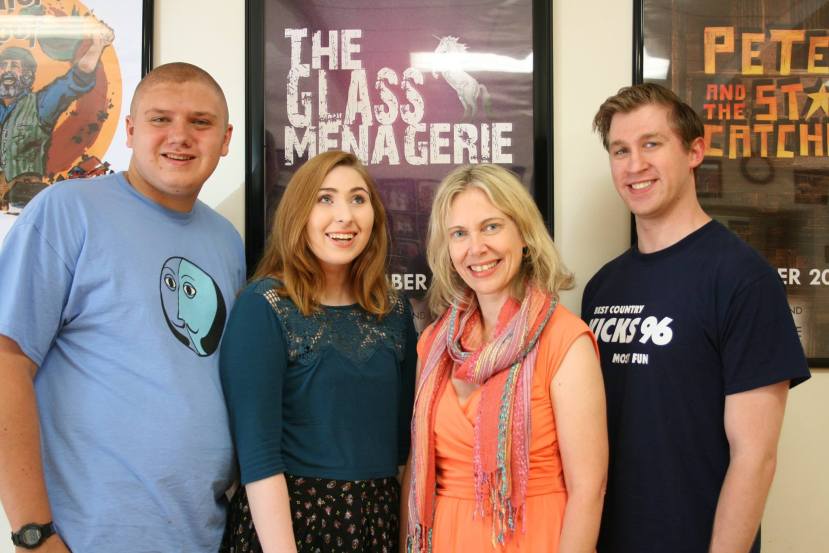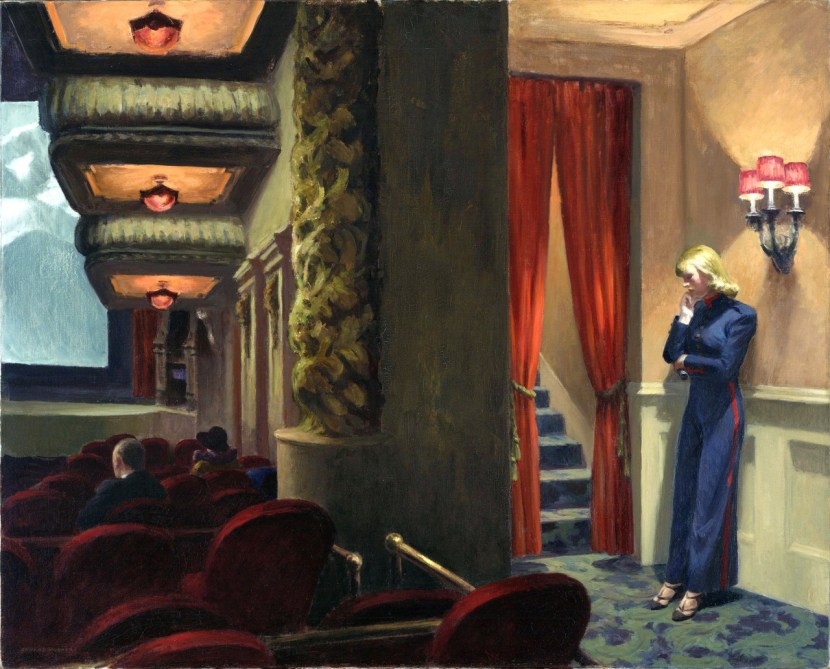Category: Richmond Civic Theatre
My Tennessee Valentine, Part 1: Invitation to the Party

“The Glasses Menagerie” with Yoda
It’s two weeks until The Glass Menagerie opens and there’s a small tribe of us hard at work over at 10th and Main.
Not that I’m complaining. This is a labor of love. Even the family dog has been pressed into service, listening to me run my lines.
For those of us who volunteer at Richmond Civic Theatre, the benefits are pretty darn amazing. It’s a chance to hang out with friends and make new ones. To face the challenge of giving our best to the audience by painting flats, learning new dance steps or memorizing pages of a script. I’m often gobsmacked at the depth of talent folks have in designing lighting, sound and sets, rustling up props, finding just the right costume, bringing words to life, stage managing and directing—often while working or going to school full time. All this in order to share a play with an audience of friends and strangers alike.
But for me, there’s another motivation for being in a show. Well, not just any show. This show.
You see, I am in love with Tennessee Williams. I fell hard for him when I was in high school. My other misfit friends and I saw pieces of ourselves in his tragic characters and dreamed of sharing an apartment in New Orleans. Turned out moving to Bloomington, Indiana was a lot easier! I love his masterful way with words. (You just wait until you hear Tom’s opening monologue or Amanda’s storytelling!) I am in love with the multi-faceted characters he creates, each one harboring a seed of secret longing that aches to burst free from its casing.
Then there’s Tennessee Williams’ courage in showing us the raw emotion of broken dreams and impossible optimism–and trusting the audience to go along for the ride. The world of The Glass Menagerie is not our world and yet the theme of claiming one’s true identity is at the core of the human experience and one I suspect we can all relate to.
For an actor, the members of the Wingfield family and the gentleman caller, Jim O’Connor, are not easy characters to play. And yet, the humanity in which Jim, Laura, Tom and Amanda are depicted give each performer the chance to find the heart of his or her character. The character I play, Amanda Wingfield, is a single mother who wants what is best for her twenty-something-year-old children. She is a woman motivated by love. Love for her children. Love for the past. Even love for her husband, a handsome telephone man who fell in love with long distance and deserted the family 16 years earlier. The way Amanda expresses this desire is, well, let’s just say it’s problematic. Hers is a fierce mother-love that threatens to suffocate the people she holds most dear. She can be exasperating and cruel one minute and innocent and charming the next.
Maybe you know somebody like that? Maybe you even see a little of that sweet complexity in yourself?
Tennessee Williams was no stranger to sweet complexity. In his career and in his personal life, he experienced dramatic highs and lows. The Glass Menagerie, Streetcar Named Desire, Cat on a Hot Tin Roof, and The Night of the Iguana are considered some of the best drama every written. Period. I am a fan, too, of his one-act plays contained in 27 Wagons Full of Cotton, including “Talk to Me Like the Rain and Let Me Listen”—which has one of the longest titles I know of and which I chose as my first directing project. And then there are the infamous lows: his troubled relationship with his family that we see alluded to in The Glass Menagerie, the heartbreak over his sister Rose’s diagnosis of schizophrenia, his financial troubles, the discrimination he experienced during his lifetime because of his identity as a gay man, and his struggles with drug addiction that eventually led to his death in 1983, some twenty years after he wrote his most critically-acclaimed plays.
To say that he wrote as he lived would be to gloss over the pain he experienced and the pain he inadvertently caused others. I don’t believe that artists have to suffer to create good art; they don’t have to be limited to the category of saint or jerk, either. However, when I read his words, I am so moved by his beauty, generosity, honesty and humor whose source is, I know, hard won. He has captured an aspect of the American experience and given it back to us as art that lasts. And so, it’s in this way that Tennessee Williams continues to inspire me—along with countless others—to wrestle with words, to love, and to live in all its messy wonder.
I am so happy to be invited to the party at the Wingfields’ and hope you will join us there, too!

RCT Cast: Jordan Wolfe, Chloe Burton, Jennie Kiffmeyer and Dustin Summan
The Glass Menagerie by Tennessee Williams
September 15-16 & 22-23 at 7:30pm, Sept. 24 at 2:00pm
By special arrangement with Dramatists Play Service, Inc.
Directed by David Cobine
1003 East Main Street
Richmond, IN 47374
Tickets are $18. Box office: (765) 962-1816 or online
My Tennessee Valentine, Part 2: Three Inspirations for Finding Amanda Wingfield

New York Movie. 1939. Oil on canvas.
by Edward Hopper
The Museum of Modern Art, New York, NY, U.S.A.
One of the fun things about exploring the world of the play is finding inspiration to bring it to life. Chloe Burton, Dustin Summan, Jordan Wolfe, David Cobine, Patty Glen and I have shared our impressions of other productions, biographical details from Tennessee Williams’ life, acting challenges and favorite lines. There are some good biographies out there on Williams for those so inclined. And then, of course, there is the play itself which rewards the reader over and over again.
Here are other three things I’ve taken inspiration from in preparing to play Amanda:
When I think of the world of The Glass Menagerie, I think of Edward Hopper’s paintings from the 1920s and 1930s. In one, we get a woman sitting up in bed alone bathed in the uncompromising light of morning. In another, famous image, a couple sitting at the counter at an all-night diner, a way station for lost souls. Reflecting Tom’s hunger for escape at the movies, Hopper even gave us a few scenes from 1930s movie houses where fantasy and reality collide. I’ve picked one here that could be similar to the kind of stumbled upon poetry that Tom escaped into every night.
When working on a show, I usually find a song that helps me connect with my character. Music that tends to be private, idiosyncratic, and good for blasting in the car on the way home from rehearsal or listening to as part of my pre-show ritual. This time around, it is Kate Bush’s “This Woman’s Work” a song from her 1989 album, The Sensual World, that gives me the chills. I can imagine the words coming straight from Amanda along with a howl as she pleads for just “one moment more” with those she loves in the hope that maybe this time she can do the right thing. Just because it’s futile doesn’t make it any less real.
Finally, I turn to contemporary poet, Mary Oliver, another writer who has written so eloquently about that life-defining moment of when one must choose to stay or go.
The Journey
by Mary Oliver
One day you finally knew
what you had to do, and began,
though the voices around you
kept shouting
their bad advice—
though the whole house
began to tremble
and you felt the old tug
at your ankles.
“Mend my life!”
each voice cried.
But you didn’t stop.
You knew what you had to do,
though the wind pried
with its stiff fingers
at the very foundations,
though their melancholy
was terrible.
It was already late
enough, and a wild night,
and the road full of fallen
branches and stones.
But little by little,
as you left their voices behind,
the stars began to burn
through the sheets of clouds,
and there was a new voice
which you slowly
recognized as your own,
that kept you company
as you strode deeper and deeper
into the world,
determined to do
the only thing you could do—
determined to save
the only life you could save.

Room in New York. 1932. Oil on canvas
by Edward Hopper
Sheldon Museum of Art
The Glass Menagerie by Tennessee Williams
September 15-16 & 22-23 at 7:30pm, Sept. 24 at 2:00pm
By special arrangement with Dramatists Play Service, Inc.
Directed by David Cobine
1003 East Main Street
Richmond, IN 47374
Tickets are $18. Box office: (765) 962-1816 or online